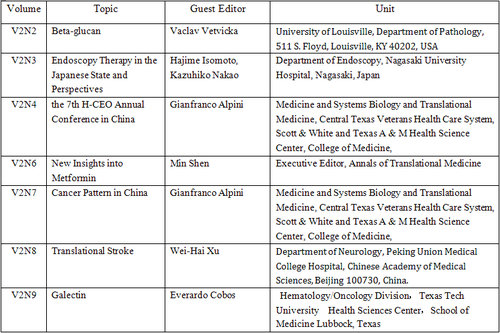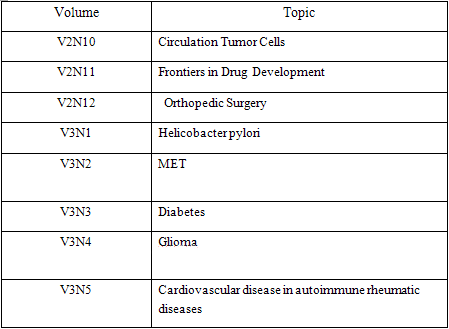On September 5, 2014, an email arrived from beyond the oceans to tell us that Annals of Translational Medicine (abbreviated to “ATM”) has been officially covered in PubMed. Successful coverage in the prestigious PubMed database may mean recognition of ATM by international peers, and a closer move towards the master publication list of SCI-indexed journals.
As a joke, friends would like to say, at first glance, ATM is easily associated with “Automatic Teller Machine” and then naturally comes the topic about money. Well, it is not a bad association but the journal ATM indicates a significant mission.
The Annals of Translational Medicine (Ann Transl Med; ATM; Print ISSN 2305-5839; Online ISSN 2305-5847) is an international, peer-reviewed Open Access journal featuring original and observational investigations in the broad fields of laboratory, clinical, and public health research, aiming to provide practical up-to-date information significant research from all subspecialties of medicine and to broaden the readers’ vision and horizon from bench to bed and bed to bench.
Why we have chosen to focus on translational medicine could be boiled down to the expectation for the future development of medicine and maybe it is worth more investment of dedication and effort than any other areas.
By definition, Translational Medicine (also referred as translational science) is a discipline within biomedical and public health research that aims to improve the health of individuals and the community by “translating” findings into diagnostic tools, medicines, procedures, policies and education (1).
Retrospectively, the rise of translational medicine is just within a few years’ time and it seems not yet to become quite a spotlight though a few themed conferences held around it and some relevant institutes were established.
The process of translational medicine is explained differently by researchers from different disciplines (2)(Figure 1). The President of ASCO, Prof. Peter Yu has once provided his views on translational science during his attendance to CSCO 2013, “I think that the translation of science is very sophisticated. That laboratory questions have been asked and with high quality lab work shows deep understanding of the translation of science.” (3)

Figure 1
With a view to bridge the existing gaps between clinicians and researchers and health policy makers, ATM was born as a quarterly journal in the spring of 2013 and humbly it grows, yet ATM has never missed the so much support and input worldwide. In 2014, ATM was released monthly. In this regard, we are grateful to our Editorial Board Members, Guest Editors, authors and reviewers who have contributed to make a difference at ATM, and to our audience who has delivered constructive opinions to make ATM more readable and relevant.
To expedite the translation of scientific discovery into new or improved standards of management and health outcomes practice, ATM covers a broad range of aspects, including multimodality therapy, epidemiology, biomarkers, imaging, biology, pathology, and technical advances related to medicine.
As introduced, one of the focuses of ATM is on Public Health. In July 2014, ATM published a special issue on Cancer Pattern in China (July 2014 issue of ATM) and opened a discussion on the topic. This topic is originated from an important work entitled “Report of cancer incidence and mortality in China, 2010”, which is authored by Dr. Wanqing Chen from National Central Cancer Registry, National Cancer Center, China.
Subsequently, experts from different countries were invited to give their own perspectives on cancer registries based on region difference. They include Prof. Stefano Rosso, Chairman of the European Network of Cancer Registries (ENCR); Prof. Joannie Lortet-Tieulent from American Cancer Society; Prof. David Roder from Cancer Epidemiology & Population Health, University of South Australia; Prof. Lihua Liu, Director of Data Utilization, Los Angeles Cancer Surveillance Program; Prof. Kota Katanoda from Cancer Information Services and Surveillance Division, Center for Cancer Control and Information Services, National Cancer Center and other illustrious experts from China, Japan and UK etc.
The collection of commentaries from different countries has provided a critical and interesting review on the cancer registries.
Since its launch in 2013, ATM has gone through 11 issues, 6 of which are special issues on different topics (table 1). This is accomplished through the unique and innovative format of each published issue. Each special issue entails around 10 international contributors and is thoroughly explored through categorized sections. The future issues of ATM are also in plan (table 2).
Table 1. Special issues that were published

Table 2. Special issues that are in plan

The rapid exchange of up-to-date knowledge and information in the platform of ATM is realized through novel media, using a web-based, digital format in addition to traditional print-version.
For further exposure of the excellent articles from ATM, we will invite the international experts to write commentaries on them and highlight these articles in Chinese. The website (https://www.atmjournal.org) will serve as the central hub and will be linked to a number of national websites (e.g. kysj.amegroups.com, www.dxy.cn), which will significantly expand the distribution of its contents.
The inclusion of ATM in PubMed heralds a new beginning! We are confident in achieving new progress with the consistent backup from our friends.
Reference:
- https://en.wikipedia.org/wiki/Translational_medicine
- Yao N. Health Services & Policy Research in translational medicine. Ann Transl Med 2014;2(7):72. doi: 10.3978/j.issn.2305-5839.2014.07.06
- Li GS. Prof. Peter Yu: opportunities and challenges in big data era. Chin Clin Oncol 2014;3(1):9. doi: 10.3978/j.issn.2304-3865.2013.11.04
